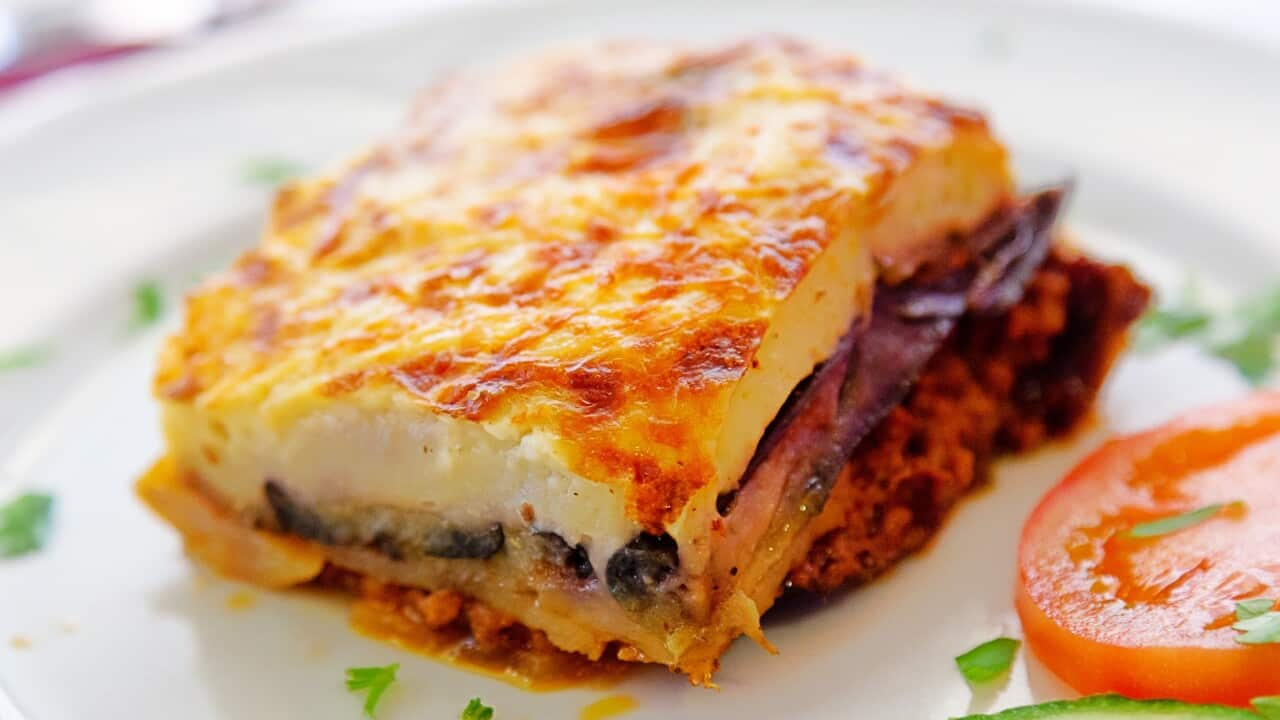It’s been around for a long time. It inspires both scientists and comedians alike. It’s one of the stereotypes that persist and made famous by plump Toula, from 'My Big, Fat Greek Wedding', hacking into a bowl of mousaka or “moose kaka” as her friends put it.
Years later her joy is palatable when a slimmer version of her bites into a white bread sandwich, sitting at the student cafeteria.
Yet, moussaka - a combination of potatoes, eggplants, zucchinis and minced meat in a rich, tomato sauce - is a much healthier choice than a highly processed, white bread sandwich.

Extra virgin olive oil is a key component of the Mediterranean diet. Source: Getty Images
Evidence backs a Mediterranean diet
A Mediterranean diet is one of the healthiest ways of eating while enjoying your food.
Olive oil, vegetables, legumes, wild greens, herbs are consumed in abundance in the Mediterranean diet followed by dairy, seafood, poultry and meat - every now and then, and in moderation.
Prof. Catherine Itsiopoulos, Head of School of Allied Health at La Trobe University, says the multiple and varied aspects of a Mediterranean diet and its health benefits are compelling for consumers and scientists alike.
"The Mediterranean diet is the most researched diet in the world. International studies and also studies we completed here in Australia demonstrate that this dietary pattern is protective for the majority of chronic diseases.”
Two decades ago professor Itsiopoulos and her colleague, associate professor Antigone Kouris launched groundbreaking research into the eating patterns of Greek migrants in Australia.
They demonstrated the benefits of the Mediterranean diet in protecting and also managing chronic and potentially life-threating conditions such as Type 2 diabetes, cardiovascular disease, metabolic syndrome and fatty liver.

Sardines provide a rich source of Omega-3 fatty acids. Source: Getty Images
One diet for all
The results and take-up rate were surprising despite the researchers’ initial reservations of having to translate this type of diet for a multi-ethnic country like Australia - home to many groups that may not had been exposed to the ingredients or tastes of a Mediterranean diet.
"We found that all of our studies which have involved people without a Mediterranean background, have found the diet very palatable, they’ve enjoyed all the recipes and so far we are not finding any difficulty in translating this eating pattern into the Australian way of life” says prof. Itsiopoulos.
Revealing the secrets
Extra virgin olive oil, leafy greens and protein from legumes are among the main elements of this type of diet. However, despite the high profile of plant based foods in the Mediterranean diet, seafood and meat also feature in moderation.
Prof. Itsiopoulos unpacks some of the secrets of this diet:
"The diet is not exclusively plant based. There are animal foods, fish in particular. For Mediterranean regions tend to be small fin fish like sardines, mollusks and shellfish, which are rich sources of Omega-3 fatty acids.”
Another “secret” is the quality of meat which was traditionally consumed. More often than not, says Prof. Itsiopoulos the meat was free range.
"That’s the key thing with the traditional Mediterranean diet: although meat was eaten, it was in smaller proportions and all the meat was free range, including eggs, which means that the fatty acid profile - the nutrients in these types of produce - are richer because the animals were allowed to graze in their natural diet."

Honey is used in Greek desserts insetadof sugar, and as seen here is a healthy option with nuts and yoghurt. Source: Getty Images
How sweet is the Mediterranean diet?
Traditionally, and this is the key word in the whole debate about healthy Mediterranean eating, sweets were reserved for special occasions.
The concept of ‘dessert after dinner’ is alien to the Mediterranean region. For example, Greeks eat fresh, seasonal fruit after a meal.
However, there is another element that distinguishes traditional, Greek sweets from modern desserts.
Honey is used in many sweets instead of sugar. Throw in this mixture the use of nuts and spices, and you have a much healthier alternative to sugary desserts.
Honey is not empty calories says Prof. Itsiopoulos. Seeds, nuts and spices provide extra nutrients and, to a certain degree, offset the extra calories if eaten in moderation. Take the traditional baklava, for example.
"It has some filo pastry and honey but it is very rich in walnuts and seeds and other nuts and spices like cinnamon. All these ingredients are very important because they provide antioxidants. Cinnamon is known for its strong anti- inflammatory properties."

Plenty of legumes, fruit and vegetables on offer at a market in Greece - all key to a Mediterranean diet. Source: Getty Images
Mediterranean diet and obesity
If the Mediterranean diet is the most researched, the health benefits undeniable, the feedback from consumers is positive and the take up rate is encouraging, why then is obesity on the rise?
According to Prof. Itsiopoulos, a lot of it has to do with the low fat products which tend to be high in sugar.
People who switched to low fat foods in the hope that their calorie intake will be lower, they have "inadvertently bumped up their carbohydrates,” says Prof. Itsiopoulos.
"I think we have the message wrong there with the low fat because the Mediterranean diet is a healthy high fat diet which is satiating and has a moderately low carbohydrate content.”
She says that obesity is a complex, multifactorial problem and stresses that health professionals need to work with the food industry and the government to ensure access to a health food supply and "not a highly processed food supply which unfortunately tends to be high in sugar, high in salt and high in unhealthy fats such as animal or saturated fats."


